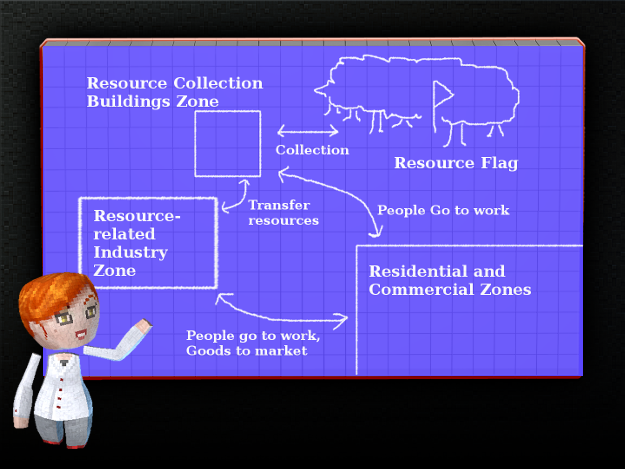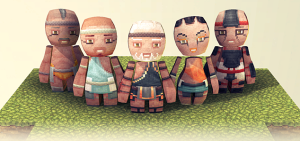Besides being some sort of adventurer/warrior, a perennially popular role games put you in is some sort of mayor, president, dictator-for-life, or other authoritarian role. With the broad scope and culture-focus of Imagine Nations, wanting to be the governmental leader of a village or even a full nation is a natural desire for many players.
Community Re-organizer

Because the villagers are expected to run by AI most of the time, anyway, player involvement in controlling the villagers may not be as direct a control as they would normally have. You can zone for what blueprints/housing/industry a village will have, and encourage use of different resources or industries, along with encouraging specific hiring quotas, but your direct control will be rather limited. “Zoning” may be a loose term for “any commercial building goes here”, or a very specific “build this specific blueprinted building here” depending on the culture. Since cultures range from individualist to collectivist, cultures dictate the latitude of mayor power.
When players zone their towns, the flags show villagers where to find resources related to their jobs. The player zones the town to make the village run as smoothly as possible, given that their resources come from flags, and go to zoned industry buildings. The mayor also manages defenses like walls or barracks to keep nasty critters out (unless it is a culture where the general has the final say with defenses.)
Being mayor means having to satisfy the needs of the citizens, and mind the peace and security from deadly external threats to the village, but also involves tamping down on deadly internal
politics in the village.
Taking a High Poll
Being mayor in Imagine Nations is not assumed. You don’t start out in a special position in your village, so you have to earn the trust and respect of the villagers of whatever village you choose to join before you can even attempt to run for office.
This plays in heavily with the factions concepts discussed earlier in this series of news posts; To climb to power, the player will need to work with the most powerful factions to gain the support it takes to make you the consensus candidate. What this means may or may not really be an idealized form of democracy in action: If a few powerful merchant family dynasties control the town, then it probably means bribing or working out deals that favor those in power over the needs of the townspeople. On the other hand, there may be a more open democratic society whose needs may be more representative of a larger chunk of the population, although they may not necessarily be less colloquial. The differences in the social progress and social quirks of different cultures shows through in which factions are the factions all politicians must appease to gain office. (Even authoritarian leaders need to keep the support of the military, lest they be ousted by force.)Rather than simply being a game of feeding your villagers, keeping any hostiles outside the walls, and the advancement of your culture thereafter being assured, leadership might be a matter of dancing around political necessities to get the backing it takes to get to the necessities of survival.
Civil (and Uncivil) Service
We also strive to make Imagine Nations a game where there are no jobs the AI does that you can’t do, and that includes leadership roles; You can take on a role in a job below a mayoral level, working on a specific committee or as a manager given specific tasks to complete, such as getting a road to the next town built for trade or irrigation canals excavated for farming. For players who do take a military path,soldiers and generals frequently fall under the command of civilian leadership, as well. It may even be a necessary step up the ladder to mayoral duties to work on a smaller job first to build up good relations and a reputation if you cannot otherwise get the backing of factions to run for mayor immediately.
Beyond that, the village is far from the highest governmental body, and players can engage in a climb up the later to running whole nations, and possibly global or inter-global governments. This isn’t necessarily the same game, but bigger; As the player moves further up the ladder, the game becomes more abstract, and players are not dealing with individual villagers, and possibly not even individual villages. It might entirely be a game of dealings with the managers of managers, and having to check their faction loyalties.
- The Imagine Nations Team
Support the Imagine Nations Crowdfunding Campaign and get “Backer’s Access” today!


